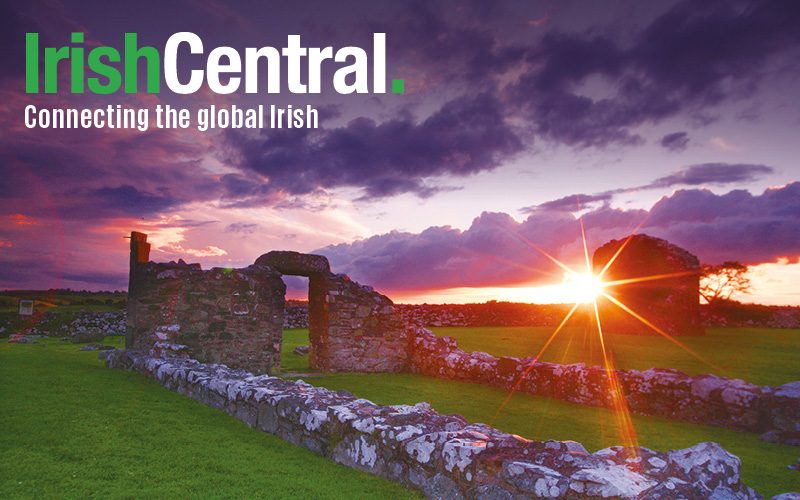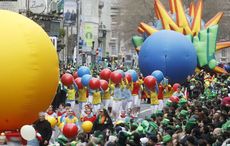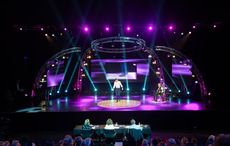The question of “The role of God in my life” requires definitions – of “God” and of “my life."
The challenge the title poses reminds me of an invitation I received in 1988 to deliver the Georgetown Bicentennial Address. Since it was at the university – not just the medical school – and since I had never been at Georgetown before, the President made what he thought was a helpful suggestion for a theme: “build your talk around the single book that, in your entire lifetime, you went back to most often for inspiration or stimulation.”
I chose the Collected Poems of W.B. Yeats, for that was a book I had read, over and over again, while courting my wife, celebrating the birth of my children, or seeking solace or perspective from the hurts of the world.
The problem was that, while I loved Yeats’s poetry, I was not a Yeats expert, and the setting for the address was to be at a university with plenty of poets and scholars. This evening I find myself, once again, in a similar situation – giving an address in a church, talking about “God,” and I am certainly not a theologian.
I will therefore approach the task with an emphasis on something about which I do know – “my life” – and will try to define a concept of “God” that began in a first generation Irish household in the Bronx. The immigrant relatives I can recall, had a deep faith in the Roman Catholic Church, and much of the cycle of our lives was defined by weekly Confessions, Lenten fasts, First Friday Masses, Baptisms, Confirmations, and the celebrations of the joy of life at the birth of the baby Jesus at Christmas or the Resurrection from the dead on Easter morning.
Nevertheless, this immigrant clan was not afraid, at least in the privacy of the home, to question both the pronouncements of religion and the logic of clergy, especially the official hierarchy.
There was a fundamental respect and loyalty to the Church but, again, this was tempered by a deep suspicion of pomposity and assumptions of unquestioned authority. We were told to beware of those “who genuflect too much”, who deferred too easily to “the cloth,” when they should be seeking justice and equity and truth, whatever that was. Also, as was typically Irish, dinner conversations were filled with probing questions regarding the mysteries of life.
My father was the first physician in a generation of police officers, and seemed to have inherited the mantle of family chieftain – at least for that part of the clan that multiplied in cold water flats from Fordham Road to Hells Kitchen, and later out to Breezy Point and Belle Harbor. He had been well trained in Jesuit logic – some people claim that is an oxymoron – and he encouraged his children to parse and analyze diverse intellectual positions. At the end of the day he would probably accept an ex cathedra declaration by the Pope, but he sure didn’t like it. He didn’t want to miss the chance to argue every facet, to see and appreciate every nuance of every issue.
I can recall him, many times, at our diner table dissecting some arcane theological argument with the local priest. It was an unfair intellectual battle, for the priest, who undoubtedly possessed profound faith had, nonetheless, little capacity to explain the basis for his devout beliefs, and my father would pursue the poor man till he surrendered with a defensive mutter: “Ah, but it’s God’s will.”
My father was a wise physician, and he knew life was rarely that simple. He would be the devil’s advocate, one night defending monotheism, and the next arguing passionately for the rights of atheists or agnostics. We were expected to stand our ground, and defend our assigned positions.
Looking back on those wonder-filled years I am reminded of the dilemma faced by the Irish sisters in Brian Friel’s play, Dancing at Lunghasa, when their beloved brother, a missionary priest in Africa, having gone “slightly native,” comes home and tries to explain the universality of religious beliefs, and the indigenous celebrations he would lead for his parishioners in appeasing a reluctant “rain God.” The traditional Irish villagers didn’t want to hear this heresy – they had their faith and their “God” - a complex Father, Son, and Holy Ghost arrangement – and that should be enough for anyone, especially a priest.
But is it? My early kitchen table education was broad and good enough to incorporate other views and, as I began my own life’s journeys, I was very grateful for the stimulating, sometimes perverse, and peculiar philosophical foundation of youth. When I first went to India – more than 50 years ago – I worked in Calcutta, where the Hindu majority believe cows are sacred, and even flies and mosquitoes might possess, in their tiny bodies, a previous being. By the time I left Calcutta, after 4 months, I really wasn’t certain that I might not be a cow in the next life, and I wasn’t really certain it mattered much.
Helping people mattered. Seeing the unique, the beautiful – call it a soul, spirit, the hand of “God” – but finding something special in every human being became the raison d’etre for my life. Obsession with theological conformity and liturgical niceties simply didn’t seem very important, as you discovered “God” in the Somali bush, or in a totally Islamic culture.
We lived for several years in the Middle East. When our second son was born there, I became very friendly with a local Italian missionary who baptized him. Fr. Ruffino once told me that as a young priest, he would measure his success in his first Chinese mission by the number of baptisms he would perform in a year and he would happily send an annual report back to the Vatican. After decades of this satisfying service to the Church he was sent to Egypt where proselytizing for a non-Islamic religion was strictly forbidden, and converting and baptizing were grounds for expulsion. He had to change his criteria; he would give witness by simply being there, but all his other ceremonial roles as a priest were over. There was but one God, and Mohammed was his Prophet. Gradually Fr. Ruffino came to accept that his Arab neighbors were his family, no better, no worse than those he once washed free of original sin in the sanctified waters of Christ.
So where does this leave me in my search for “God”? A poet – who happened to be a Jesuit priest – once wrote of the odd manifestations of the Almighty. Gerard Manley Hopkins discovered Christ, not in vestments, or on an altar, but in everyday life:
Glory be to God for dappled things - For skies of couple-colour as a brinded cow; For rose-moles all in stipple upon trout that swim; Fresh-firecoal chestnut-falls; finches' wings; Landscape plotted and pieced-fold, fallow,
And plough; And all trades, their gear and tackle and trim.
All things counter, original, spare, strange; Whatever is fickle, freckled (who knows how?) With swift, slow; sweet, sour; adazzle, dim; He fathers-forth whose beauty is past change:
Praise him.
I think that is where I come out. After many years of medical practice,
long periods of loneliness and reflection in what some would call the God-forsaken deserts of Somalia, or the swamps of Sudan, or working all over the world amidst refugees in the chaos that follows war and natural disasters, I found my own spiritual strength.
I can identify with the Christ who came down to wash feet, know rejection and die on a cross. Hidden in the humble, sacred pockets of life are the good thieves who will go to paradise, the trusting leper who will be cured.
The Resurrection, to me, is reflected every day in the tenacity and nobility of sick people, and the remarkable resilience of men, women, and children, often against overwhelming odds.
For many years I have devoted much of my non-clinical energies in trying to identify workable bridges between medicine, public health, and the softer discipline of diplomacy. One only has to work in conflict zones for a very short time to appreciate the dehumanizing effects of fear, injury, rape, or even of survival under appalling refugee conditions. No avenue can be left untried in the search to heal the wounds of war and build a new peace.
When combatants can agree on little else they sometimes – not always – will cease killing and maiming only for a humanitarian effort – one that can often help both sides. Using this respect for health projects, we established “corridors of tranquility, neutral areas in bitter civil wars.
These pauses allowed for discussion and dialogue; no matter how brief, they can provide the foundation blocks for eventual reconciliation.
It is sometimes difficult to talk about “God” to those intent on destroying their enemies, and formal religions have had a pretty dismal record in the search for peace. An inordinate amount of people still die because of differences over what is considered “the true faith,” surely an odd justification for the slaughter of neighboring innocent civilians. In the former Yugoslavia, both Secretary of State Cyrus Vance and Lord David Owen tried for three years to find a compromise to end the killing. They told me, in deep frustration, that none of the religious leaders –Muslim, Orthodox, or Roman Catholic – ever found the courage to move beyond their parochial concerns.
At The Center for International Humanitarian Cooperation we have recently initiated a project that will try to identify universal values, the common spirituality that seems to exist in all cultures, even during wars. All over the world different civilizations have developed methods — sometimes positive, sometimes negative —to prevent the worst excesses of war. These strands of humanitarian decency must be emphasized, and woven, not only into Geneva Conventions and legal documents, but into some commonly accepted fabric so that we can learn to survive together, not threatened by, but actually celebrating the diversity of, mankind.
It is in this search for universal values, a search that may allow peace to be reborn from the ashes of war, that today I most clearly see “God.” It is into that troubled gray zone of conflicts and reconstruction that I hope “God” will help and guide me in leading a better life of service to those in need.
*As a distinguished doctor of medicine, Dr. Kevin Cahill Cahill began his medical career in 1961, studying tropical disease in the slums of Calcutta beside Mother Theresa.
Cahill has cared for patients in 65 countries in some of the most war-torn places in the world, and was among the first to predict the famine in Somalia.. He treated Pope John Paul after his assassination attempt and also President Ronald Reagan. He is President-General of the American Irish Historical Society
This is an essay in To Bear Witness: A Journey of Healing and Solidarity which will be published by Fordham Univ. Press in 2013.




Comments